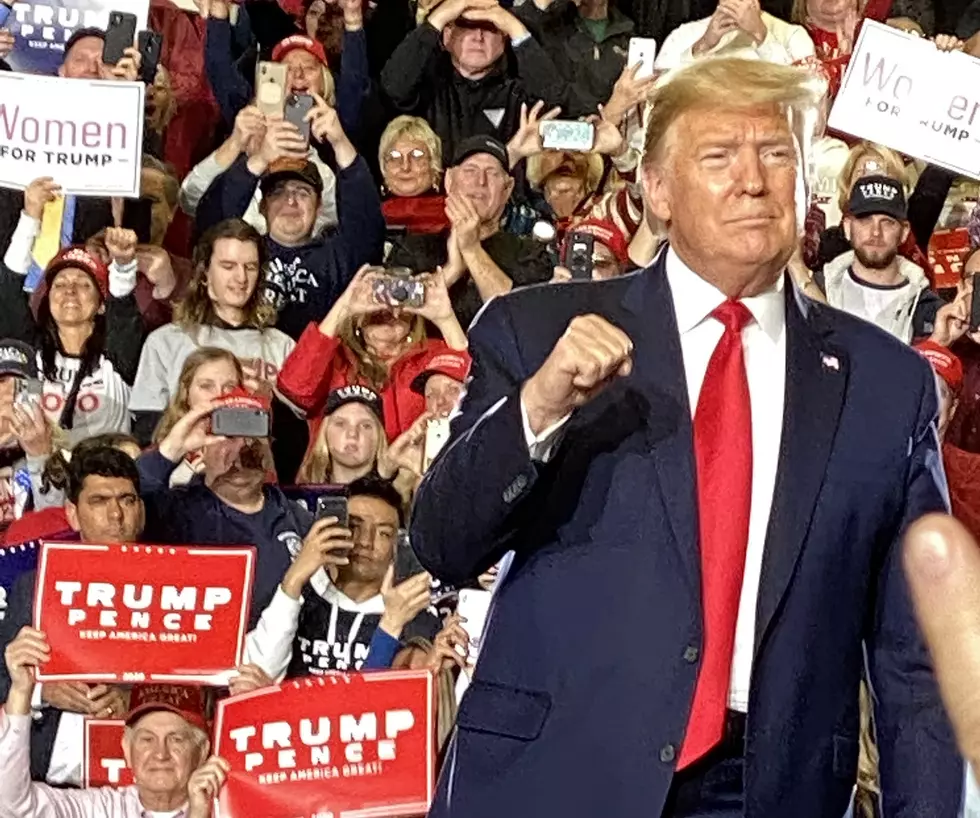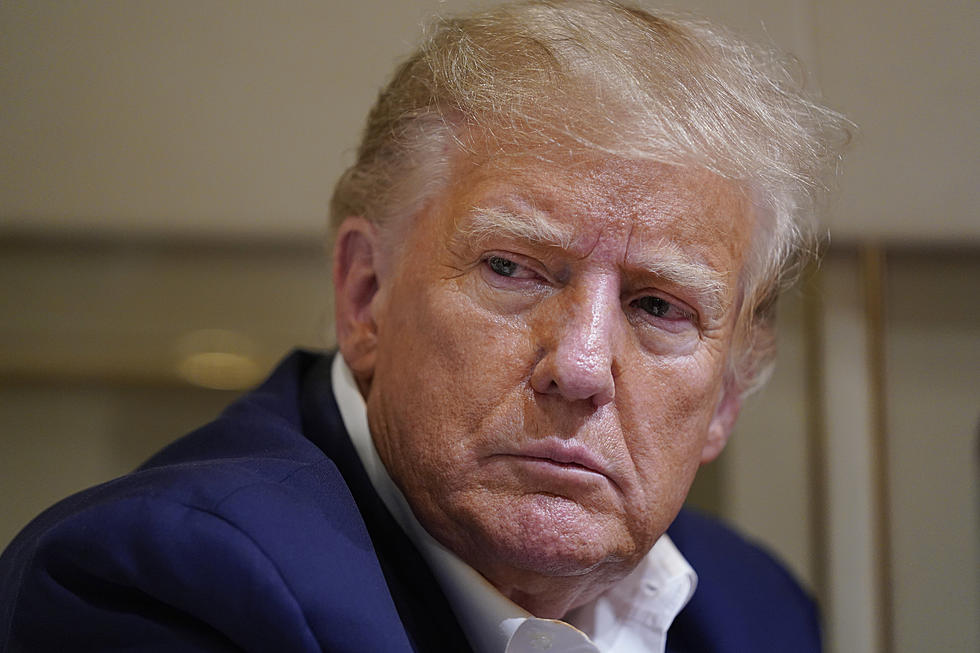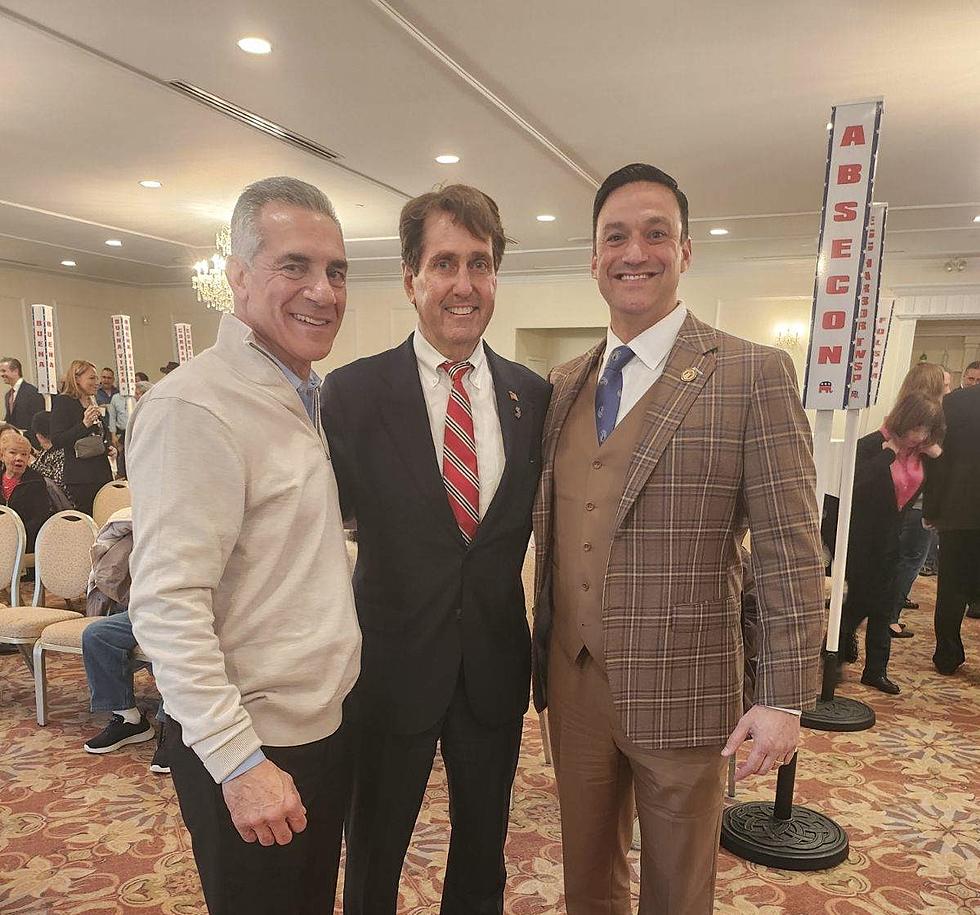
Trump was deemed not ‘a threat’ for Bedminster trip, despite exposure
The White House's communications director said Sunday afternoon President Donald Trump "wasn't deemed to pose a threat" when he traveled to Bedminster Sunday for a fundraiser — even though he was known to have been exposed to an aide who'd tested positive for novel coronavirus.
The president received a positive coronavirus test later that day. Local and federal health officials are in the midst of contact tracing, trying to determine how many people in Bedminster may have been exposed during the president's visit to his New Jersey golf course for a high-ticket fundraiser.
A pool report issued just after 2 p.m. by Axios White House reporter Alayna Treene said communications director Alyssa Farah "would not answer questions about when the president first received a rapid test Thursday and what those results were."
"Asked why the president still traveled to Bedminster, NJ on Thursday, she said it 'was a decision made by White House operations because he wasn't deemed to pose a threat.'"
Treene said in a follow-up filing that Farah promised to get her a more detailed answer. As of 5:30 p.m., no new pool report had been issued reflecting one.
White House officials have confirmed some senior staffers and the president knew aide Hope Hicks had tested positive for the coronavirus Thursday, before he left for Bedminster. Hicks had traveled with the president over the last week, including to Tuesday's debate against Democratic presidential nominee Joe Biden, where moderator Chris Wallace says the president's family refused to wear masks despite venue requirements.
The Centers for Disease Control's guidance — which the White House didn't follow — recommends contact tracing for any individual within 6 feet of an infected person for at least 15 minutes. It says those without symptoms and testing negative should still quarantine for 14 days from their last exposure.
Health officials also note a test issued very soon after exposure may come back negative despite coronavirus transmission, and recommend being tested several days later for a more accurate result. The president is tested frequently, but White House officials and his doctors haven't said when he received his last negative test result.
The president's physician — speaking from Walter Reed Military Medical Center, where Trump is being treated — sparked confusion when he seemed to suggest Saturday that the president was aware of his own positive status before attending the Thursday fundraiser, when he referred to "72 hours" taking place since a diagnosis. But the doctor, Navy Cmdr. Sean Conley, later clarified in statement he meant instead the president was in his third day of a diagnosis. The White House has said the president received his positive result an hour before announcing it in Twitter, which he did just before 1 a.m. Friday.
Meadows had also said Saturday the president was exhibiting "clinical indications that (caused) a little bit more concern" Thursday afternoon. It wasn't immediately clear from his statement if that meant before, during or after the fundraiser.
Attendees speaking to media this weekend said they were not told of the president's exposure during or before the event. ABC this weekend spoke to several attendees of the fundraiser who said they are now quarantining and getting coronavirus tests.

Questions on contact tracing
The Somerset County Department of Health Sunday, in response to an inquiry from New Jersey 101.5., said it and the state health department had been in touch with the management of the Trump National Golf Course and the White House.
It said the White House provided the names of 206 people who attended events with Trump in Bedminster. Though asked to in an email from New Jersey 101.5, the county health department didn't address a report by NBC, citing unnamed state officials, saying the White House only provided email addresses, but not phone numbers for attendees, frustrating state officials who needed more complete contact information to do tracing quickly.
The county said it had reached out to the attendees "to make them aware of possible exposure and recommend that they self-monitor for symptoms and quarantine if they were in close contact with the president and his staff."
It also said the county health department was interviewing staff members of the club, "and assessing the level of contact they had with the "resident and his staff and providing public health recommendations accordingly." Most staffers reside in the county, it said.
In line with broader health recommendations, the county urged those at the events to "consider waiting at least 5-7 days" to get tested.
"While the risk is low, a negative test earlier than that time cannot definitively rule out that COVID-19 will not develop. Those who are concerned that they were in close contact should quarantine for 14 days," it said.
The county's statement, and another issued early in the day, didn't address several questions from New Jersey 101.5 sent in two emails Sunday. It didn't say how many people had been reached so far, what local officials knew about any safety or social distancing practices at the Trump fundraiser, or whether anyone who'd been in contact with the president and his staff had since tested positive. It also didn't say whether attendees had been cooperative with contact tracers.
White House spokesman Judd Deere said in a statement that full contact tracing, consistent with guidelines from the Centers for Disease Control and Prevention, was completed for the president's Bedminster trip. Trump did not have any interactions with Bedminster staff or guests that would be considered to be “close” based on the guidelines, Deere said.
Dallas businessman Daniel Hux, who attended the event, said he was feeling fine Sunday, and had just undergone another test, as he and other donors had before the fundraiser.
“I’m grateful our President engaged his supporters safely while at the event,” Hux said in a statement. ”My prayers are with our President and the first lady."
Hux, who owns a mortgage company, declined to say where he had traveled in the interim. He said he was never within 6 feet of the president, but was quarantining just in case.
Dr. Rich Roberts, a pharmaceutical executive from New Jersey who made a video describing the event, said he sat a seat away from Trump during an indoor roundtable event, which he said involved about 19 people and lasted perhaps 45 minutes or more. Roberts did not return messages Sunday from The Associated Press about the video, which was posted to The Lakewood Scoop.
Charlie Kolean, also from Dallas, said the coronavirus test he took upon returning home from New Jersey came back negative Sunday. He’ll take another one in a few days.
Kolean, who works in investments, said from what he noticed at the event, Trump campaign members were all masked and socially distant, as were Bedminster staff, who also wore gloves.
During the photo opportunity with the president, the 25-year-old said donors were required to stand 6 feet from the president, on a marker taped to the floor.
“I know there were rumors of him being lethargic or tired. That was not the case at all at this event. He was very high energy, happy to be there. I noticed no difference in his health from previous times I’ve seen him," Kolean said.
CNN, in a report Sunday morning, said Trump attended three events at the fundraiser, citing an invitation to the event — an indoor roundtable, an indoor VIP reception, and an outdoor reception. Donors who gave $250,000 were able to participate in the roundtable. It cited a source saying that included 18 people, at socially distanced tables.
The CNN report cited other sources saying attendees were tested for coronavirus, but that most people did not wear masks. It said attendees were not informed the president had been exposed.
Open questions on president's progress
Conley said Sunday that Trump is doing well enough that he might be sent back to the White House in another day — even as he announced the president was given a steroid drug that’s only recommended for the very sick.
Steroids like dexamethasone — given to the president after a drop in oxygen levels on Saturday — tamp down important immune cells, raising concern about whether the treatment choice might hamper the ability of the president’s body to fight the virus.
Conley acknowledged Sunday that that he had tried to present a rosy description of the president’s condition in his first briefing of the weekend “and in doing so, came off like we’re trying to hide something, which wasn’t necessarily true.” Conley had refused to directly answer on Saturday whether the president had been given any oxygen — only to admit the next day that he had ordered oxygen for Trump on Friday morning.
He also declined to say whether Trump had suffered any lung damage.
“It’s a little unusual to have to guess what’s really going on because the clinical descriptions are so vague,” said Dr. Steven Shapiro, the University of Pittsburgh Medical Center’s chief medical and science officer. With the steroid news, “there's a little bit of a disconnect.”
Dr. Stephen Xenakis, a psychiatrist who retired from the Army medical corps as a brigadier general, said Conley would be obliged to follow Trump’s wishes regarding what information about his condition is released publicly, as is true in any doctor-patient relationship. But Conley as a military medical officer is bound to adhere to the Uniform Code of Military Justice, which prohibits lying, he said.
What’s known about Trump’s current treatment: He was given an experimental antibody drug that most people could get only in a research study -- along with a course of remdesivir, an antiviral, earlier than most patients.
Pittsburgh's Shapiro, who is both a lung and critical care specialist, called those reasonable decisions: The idea is to help the body fight the virus early, before it triggers a lung-damaging inflammatory overreaction.
What Trump’s medical team hasn’t mentioned: Whether he’s getting blood thinners, which are being given to nearly all hospitalized COVID-19 patients to prevent virus-triggered blood clots that in turn harm the lungs and other organs.
And giving the steroid drug to a mildly sick patient disregards treatment guidelines from the National Institutes of Health and World Health Organization that say it’s only for people ill enough to need oxygen. For seriously ill people, research shows that once the virus has escaped the immune system, dexamethasone can tamp down the resulting inflammation and save lives.
“If they’re really talking about discharge tomorrow, and he really isn’t on oxygen,” Shapiro said, “then it’s more likely that the dexamethasone is just thrown in there as more one more thing that probably isn’t necessary and might not even be helpful.”
“The next few days are going to be key," Shapiro noted.
Vice President Mike Pence and his wife, Karen, tested negative again for the coronavirus Sunday, according to a spokesperson.
Former New Jersey Gov. Chris Christie on Saturday evening checked himself into Morristown Medical Center, saying he was taking precautions because of his coronavirus diagnosis. Christie announced his positive test result Saturday morning, a day after President Donald Trump was hospitalized at Walter Reed National Military Medical Center with COVID-19.
Christie said in a tweet he has only experienced mild symptoms but "due to my history of asthma we decided this is an important precautionary measure." He hadn't issued any update on his condition as of early Sunday evening.
Christie helped the president prepare for his debate against Democratic presidential nominee Joe Biden, held last Tuesday. He has said no one was wearing masks in the room where preparations were held.
Former White House adviser and New Jersey native Kellyanne Conway is also one of several people in the president's orbit to test positive since Trump's announcement. She, like many of the others, had attended a Rose Garden ceremony in which President Donald J. Trump announced Judge Amy Coney Barrett as his nominee for the U.S. Supreme Court.
Includes material copyright 2020 The Associated Press. All rights reserved. This material may not be published, broadcast, rewritten or redistributed.
Also includes previous reporting by Sergio Bichao
From Wuhan to New York City: A Timeline of COVID-19's Spread
More From WPG Talk Radio 95.5 FM










